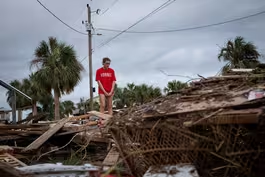
What to know about Israel’s killing of Hezbollah’s leader
Clip: 9/28/2024 | 7m 54sVideo has Closed Captions
What to know about Israel’s killing of Hezbollah leader Hassan Nasrallah
Israel’s assassination of Hezbollah leader Hassan Nasrallah is reverberating across the region, raising fears of retaliation from Iran and a wider war. Nick Schifrin reports from Tel Aviv and joins John Yang to discuss the latest developments and what to expect next.
Problems playing video? | Closed Captioning Feedback
Problems playing video? | Closed Captioning Feedback
Major corporate funding for the PBS News Hour is provided by BDO, BNSF, Consumer Cellular, American Cruise Lines, and Raymond James. Funding for the PBS NewsHour Weekend is provided by...

What to know about Israel’s killing of Hezbollah’s leader
Clip: 9/28/2024 | 7m 54sVideo has Closed Captions
Israel’s assassination of Hezbollah leader Hassan Nasrallah is reverberating across the region, raising fears of retaliation from Iran and a wider war. Nick Schifrin reports from Tel Aviv and joins John Yang to discuss the latest developments and what to expect next.
Problems playing video? | Closed Captioning Feedback
How to Watch PBS News Hour
PBS News Hour is available to stream on pbs.org and the free PBS App, available on iPhone, Apple TV, Android TV, Android smartphones, Amazon Fire TV, Amazon Fire Tablet, Roku, Samsung Smart TV, and Vizio.
Providing Support for PBS.org
Learn Moreabout PBS online sponsorshipJOHN YANG: Good evening.
I'm John Yang.
We're following two big stories tonight, the rising exchange of rockets and bombs between Israel and Hezbollah and the rising death toll from Hurricane Helene.
We begin in the Middle East, where Israel's assassination of Hezbollah leader Hassan Nasrallah is reverberating across the region, raising fears of retaliation from Iran and a wider war.
Tonight, Nick Schifrin is in Tel Aviv.
NICK SCHIFRIN (voice-over): This evening, Southern Beirut is still smoldering after what residents called the most intense bombing in nearly 20 years on a cluster of high rises and the bunker beneath them killing Hassan Nasrallah, Hezbollah's leader for the last three decades.
The group confirmed his death on its TV channel After the Israel Defense Forces posted on social media, Hassan Nasrallah will no longer be able to terrorize the world.
Israeli Prime Minister Benjamin Netanyahu.
BENJAMIN NETANYAHU, Prime Minister, Israel (through translator): At the start of the week, I came to the conclusion that the intense blows the Israeli military struck Hezbollah within the past days, these blows will not be enough.
Nasrallah's assassination was an essential condition to achieving the goals we set.
NICK SCHIFRIN (voice-over): Nasrallah was Hezbollah's commander and communicator in chief.
His charisma made him powerful in Lebanon and one of the Middle East most influential figures.
He inspired Shia followers with fiery speeches and the sacrifice of his own son fighting Israel, even if for years he has only spoken remotely.
For Iran, Hezbollah became its key proxy, and Nasrallah anchored its Axis of Resistance, a close confidant of Iran's supreme leader, Ayatollah Khamenei.
In Tehran today, the regime's supporters vowed revenge.
MAHDIAN, Protester (through translator): We have heard the message clearly.
With the killing of Nasrellah, Israel will be destroyed.
Israel is finished, for sure.
The oppressor Israel will go.
NICK SCHIFRIN (voice-over): But in southern Beirut, the smoke hasn't yet cleared, and residents are beginning an overwhelming cleanup.
Many have fled 100,000 just in the last week, some from Lebanon to Syria, despite its civil war.
They're too scared to spend the night in their southern Lebanon homes, so they sleep outside longing for a safer present and future.
ZAINAB FADEL, Displaced from Southern Lebanon (through translator): May God protect the people who were displaced from their homes and those who fled the south and all the areas affected by the war.
May God protect them.
NICK SCHIFRIN: Tonight, President Biden called Nasrallah's death a quote measure of justice for his many victims, but added the U.S. aim was to quote deescalate the ongoing conflicts in both Gaza and Lebanon through diplomatic means.
But tonight, the means that we're seeing from both sides, John, are military strikes and rocket attacks.
JOHN YANG: Nick, what is this going to do to Hezbollah, taking out Nasrallah?
What is this going to do to the organization?
NICK SCHIFRIN: It's going to have an enormous impact, John.
Tonight, Defense Minister, Yoav Gallant.
His death quote, the most important targeted strike since the founding of Israel.
As we said in our piece, he was the commander in chief of Hezbollah, extracting real pain from Israel over the past 30 plus years, including a war in 2006 all the way to last year's decision to link the wars between Hezbollah and Israel, with the ongoing fighting between Israel and Hamas in Gaza.
But he was also, as I pointed out, the communicator in chief.
He was able to create that fierce following that we talked about, and in fact, that following was so fierce, it's going to take time for any leader, really, to fill his shoes.
For Iran, he was an excellent return on investment, again, taking a bite out of Israel multiple occasions, helping Iran in Syria when it wasn't so popular among the Hezbollah rank and file, for Hezbollah to go into Syria, and also becoming the real anchor for Iran's Axis of Resistance.
And that means, in the short term, that Iran is likely to take more control over Hezbollah, says Randa Slim of the Middle East Institute.
RANDA SLIM, Middle East Institute: Anything that affects the stability of Hezbollah will affect the stability of that axis, and so it will have impact.
But in the long term, even in the medium term, they will reorganize, they will regroup.
There will be new leaders emerging, and in the interim, given the shake up inside the organization, given the role that Nasrallah played, especially in terms of the command and control decision making, I will expect more role or more control by the IRGC Quds Force of the decision making inside Hezbollah, especially in the in the military sphere.
NICK SCHIFRIN: And part of what we expect, of course, John, is for Iran and Hezbollah to decide how to strike back after Nasrallah's killing JOHN YANG: Nick, I know you've got a broad range of sources over there in the region.
What the people you're talking to, what do they think, or what do they expect is going to happen now?
NICK SCHIFRIN: Well, John, prediction is difficult, especially about the future, as Yogi Berra says, but U.S. officials really insist that this is a pivot point.
Publicly, they want the pivot point to be toward diplomacy.
What does that look like?
That looks like Hezbollah agreeing to what they agreed after the end of the 2006 war, Security Council resolution 1701 moving back from the border, moving back behind the Latani River, which on average, is about 18 miles from the border.
But a senior U.S. official tonight tells me that privately, they actually believe this is an opportunity to, quote, dismantle the biggest of their proxies and free Lebanon of their political and armed stranglehold.
In other words, get rid of, or at least severely diminish Hezbollah's influence in Lebanon.
Now, the group has taken a serious military blow, not only with Nasrallah's killing, but also going back last week to those pager attacks, the walkie talkie attacks, really the decimating of the senior military leadership.
So the diplomatic goal in the short term might be achievable, but that long term, more ambitious goal is not, says Randa Slim.
RANDA SLIM: There is, in my opinion, a short window opportunity right now where Hezbollah feels is really weak, and where it's going to need time to regroup, to organize, and they will be amenable to the delinking between the Raza theater and the Lebanon theater.
But in terms of eliminating Hezbollah, let the Israelis tell them about eliminating Hamas.
And Hezbollah is much, much, much more powerful than Hamas.
NICK SCHIFRIN: And it's not clear John, whether the U.S. or anyone else really has a partner in Beirut who would be willing and able to try and take Hezbollah's military and political power on.
JOHN YANG: Speaking of Hamas, speaking of Gaza, what -- is this going to have any effect, you think, on the war in Gaza?
NICK SCHIFRIN: U.S. officials certainly hope it does that if there's some kind of reduction in violence in Lebanon, they can reduce the violence in Gaza, and that big statement by the G7 by President Biden, by French president Emmanuel Macron, a few days ago about the ceasefire in Lebanon directly linked the cease fire in Gaza.
But the fact is that the Israeli operation in Gaza continues.
The Israeli military says that it has not finished what it's trying to do.
The Israeli Prime Minister Benjamin Netanyahu, said that he was undergoing still mopping up operations, so it's not clear that any reduction or any change in Lebanon could lead to a direct change in Gaza.
John.
JOHN YANG: Nick Schifrin in Tel Aviv.
Thanks to you and cameraman Eric O'Connor.
NICK SCHIFRIN: Thanks John.
Florida’s Big Bend begins long cleanup after Helene landfall
Video has Closed Captions
Clip: 9/28/2024 | 2m 35s | Florida’s Big Bend region begins lengthy cleanup in the aftermath of Helene’s landfall (2m 35s)
New wearable technology takes us into the minds of babies
Video has Closed Captions
Clip: 9/28/2024 | 2m 40s | New wearable technology takes us into the minds of babies (2m 40s)
Schools face tough choices as pandemic-era funding runs out
Video has Closed Captions
Clip: 9/28/2024 | 7m 25s | School districts face tough choices as last of pandemic-era federal aid runs out (7m 25s)
Providing Support for PBS.org
Learn Moreabout PBS online sponsorship
- News and Public Affairs

FRONTLINE is investigative journalism that questions, explains and changes our world.

- News and Public Affairs

Amanpour and Company features conversations with leaders and decision makers.












Support for PBS provided by:
Major corporate funding for the PBS News Hour is provided by BDO, BNSF, Consumer Cellular, American Cruise Lines, and Raymond James. Funding for the PBS NewsHour Weekend is provided by...


